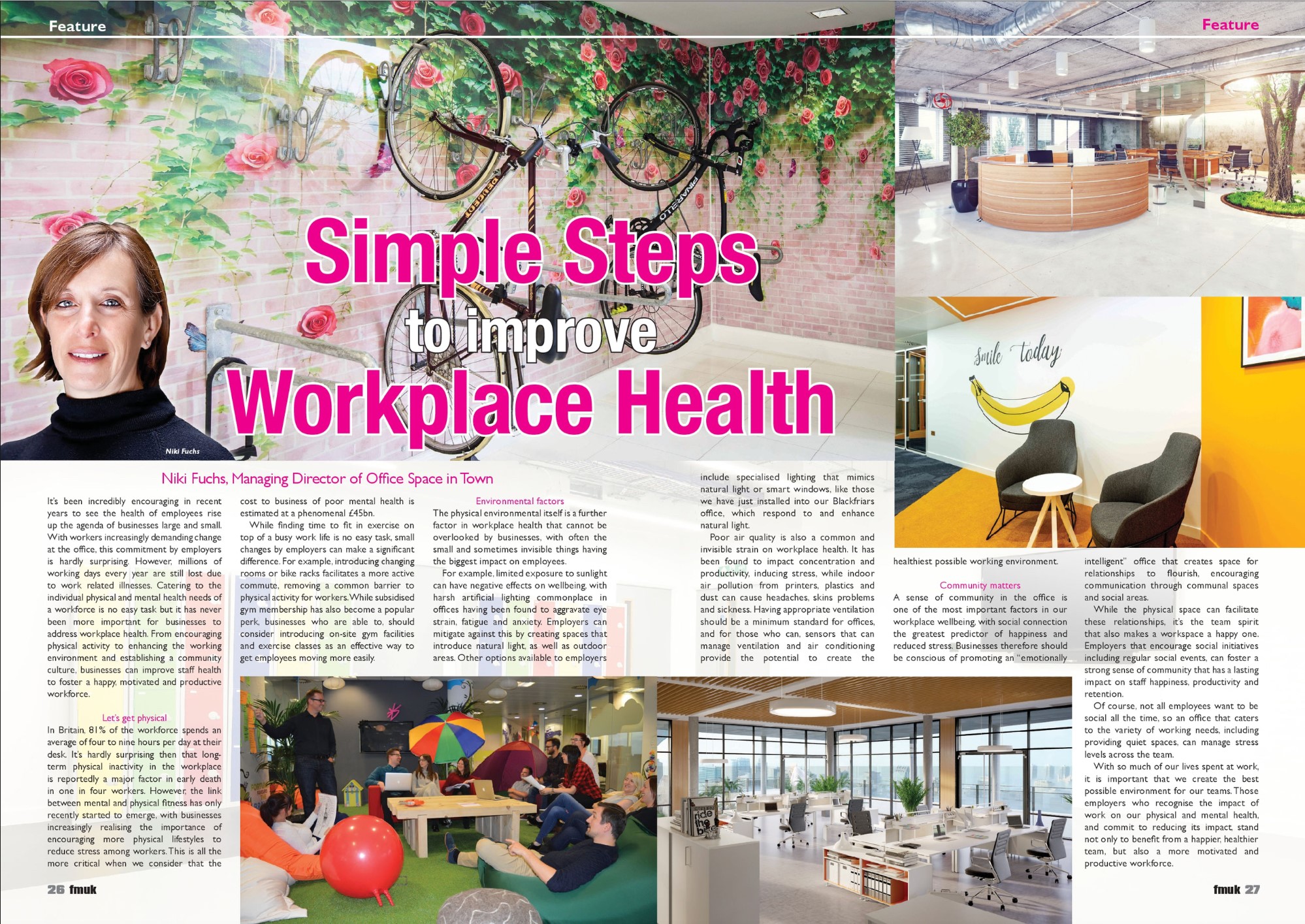Simple Steps To Improve Workplace Health
By Niki Fuchs, Managing Director of Office Space in Town
It’s been incredibly encouraging in recent years to see the health of employees rise up the agenda of businesses large and small. With workers increasingly demanding change at the office, this commitment by employers is hardly surprising. However, millions of working days every year are still lost due to work related illnesses. Catering to the individual physical and mental health needs of a workforce is no easy task but it has never been more important for businesses to address workplace health. From encouraging physical activity to enhancing the working environment and establishing a community culture, businesses can improve staff health to foster a happy, motivated and productive workforce.
Let’s get physical
In Britain, 81% of the workforce spends an average of four to nine hours per day at their desk. It’s hardly surprising then that long-term physical inactivity in the workplace is reportedly a major factor in early death in one in four workers. However, the link between mental and physical fitness has only recently started to emerge, with businesses increasingly realising the importance of encouraging more physical lifestyles to reduce stress among workers. This is all the more critical when we consider that the cost to business of poor mental health is estimated at a phenomenal £45bn.
While finding time to fit in exercise on top of a busy work life is no easy task, small changes by employers can make a significant difference. For example, introducing changing rooms or bike racks facilitates a more active commute, removing a common barrier to physical activity for workers. While subsidised gym membership has also become a popular perk, businesses who are able to, should consider introducing on-site gym facilities and exercise classes as an effective way to get employees moving more easily.
Environmental factors
The physical environmental itself is a further factor in workplace health that cannot be overlooked by businesses, with often the small and sometimes invisible things having the biggest impact on employees.
For example, limited exposure to sunlight can have negative effects on wellbeing, with harsh artificial lighting commonplace in offices having been found to aggravate eye strain, fatigue and anxiety. Employers can mitigate against this by creating spaces that introduce natural light, as well as outdoor areas. Other options available to employers include specialised lighting that mimics natural light or smart windows, like those we have just installed into our Blackfriars office, which respond to and enhance natural light.
Poor air quality is also a common and invisible strain on workplace health. It has been found to impact concentration and productivity, inducing stress, while indoor air pollution from printers, plastics and dust can cause headaches, skins problems and sickness. Having appropriate ventilation should be a minimum standard for offices, and for those who can, sensors that can manage ventilation and air conditioning provide the potential to create the healthiest possible working environment.
Community matters
A sense of community in the office is one of the most important factors in our workplace wellbeing, with social connection the greatest predictor of happiness and reduced stress. Businesses therefore should be conscious of promoting an “emotionally intelligent” office that creates space for relationships to flourish, encouraging communication through communal spaces and social areas.
While the physical space can facilitate these relationships, it’s the team spirit that also makes a workspace a happy one. Employers that encourage social initiatives including regular social events, can foster a strong sense of community that has a lasting impact on staff happiness, productivity and retention.
Of course, not all employees want to be social all the time, so an office that caters to the variety of working needs, including providing quiet spaces, can manage stress levels across the team.
With so much of our lives spent at work, it is important that we create the best possible environment for our teams. Those employers who recognise the impact of work on our physical and mental health, and commit to reducing its impact, stand not only to benefit from a happier, healthier team, but also a more motivated and productive workforce.


























































